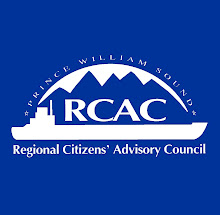Tug grounding raises troubling questions, reinforces lessons of Exxon Valdez spill
Steve Lewis, president of the Prince William Sound Regional Citizens’ Advisory Council, today issued this statement on the Dec. 23, 2009, grounding of the ice scout tug Pathfinder on Bligh Reef in Prince William Sound
Like most Alaskans, we at the Prince William Sound Regional Citizens’ Advisory Council are baffled as to how the Pathfinder managed to hit perhaps the most famous navigational hazard in the world—Bligh Reef—in conditions of relatively mild weather.
While many of the facts surrounding this grounding are not yet available, it seems at first blush to raise serious questions about the safety of oil industry operations in the Sound, and about how well the painful lessons of the Exxon Valdez spill of 1989 have been learned by today’s mariners. The Exxon tanker also hit Bligh Reef, spilling an estimated 11 million gallons of North Slope crude oil into the Sound on March 24, 1989.
Among the questions raised by the Pathfinder grounding:
Why did the crew of the tug not realize their peril, from radar readings, from visual observations, or from basic navigational awareness, in time to avert the accident?
Why did the Coast Guard’s Vessel Traffic Center in Valdez, with its radar systems and other equipment, not detect the danger in time to warn the tug’s crew?
While environmental damage from the spill that resulted from this grounding appears to have been minimal—in considerable part because the product spilled was diesel fuel rather than crude oil—it nevertheless serves as a warning that we can never forget the lessons that the Exxon spill 20 years ago taught Alaskans, the oil industry, and its regulators in Prince William Sound:
* Constant vigilance is the price of safety. In an operation involving the transport of hazardous petroleum products through a beautiful natural environment, there is never a single moment when any individual or organization can relax and assume the system is safe because there hasn’t been an accident lately.
* Backup systems are indispensable, and they need to be in place and operating. The Coast Guard radar center in Valdez is one of the backup systems in the Prince William Sound oil trade, but it does not appear to have been of any assistance in this incident.
* Another backup system involving mitigation of the iceberg risk in Prince William Sound was inoperative at the time of this incident. That system was the iceberg detection radar system that was installed on Reef Island—which overlooks Bligh Reef—several years ago after much expenditure and effort by our council, Alyeska Pipeline Service Co., and the Coast Guard. This system scans westward from Bligh Reef to detect icebergs from Columbia Glacier emerging into the tanker lanes from Columbia Bay—the same function performed by ice scouts like the Pathfinder. Unfortunately, this system has been inoperative since late summer, after a Coast Guard upgrade to its own system on Reef Island took the iceberg detection radar system offline. This radar can detect icebergs in weather too dark or too foggy to permit reliable visual detection by human observers and thus can be a valuable adjunct to ice scout vessels or even make a scouting trip unnecessary if the radar detects very heavy accumulations of icebergs in the tanker lanes, though that was not the case in the Pathfinder grounding. Thus, the council believes it is of paramount importance to restore this system to service and has been working with Alyeska and the Coast Guard to that end.
Our council was set up to make sure that the complacency that allowed the Exxon Valdez disaster to occur never reasserts itself. That is the main reason we have been working so hard to preserve another crucial backup system in Prince William Sound: the system of double escort tugs to escort loaded oil tankers through the Sound. Our group is now lobbying Congress for federal legislation to preserve the double escorts so that, if another tanker should someday go astray and head for Bligh Reef, backup will be close at hand to prevent another catastrophe like the one in 1989.
Whatever the final cause of the Pathfinder grounding is determined to be, we hope this incident will serve as a forceful reminder to the oil industry and its regulators that complacency never sleeps, so humans must never let down their guard in Prince William Sound.
Steve Lewis is president of the board of the Prince William Sound Regional Citizens’ Advisory Council, where he represents the city of Seldovia. The council is an independent non-profit corporation whose mission is to promote environmentally safe operation of the Valdez Marine Terminal and the oil tankers that use it. The council's work is guided by the Oil Pollution Act of 1990, and its contract with Alyeska Pipeline Service Company. The council's 18 member organizations are communities in the region affected by the 1989 Exxon Valdez oil spill, as well as aquaculture, commercial fishing, environmental, Native, recreation, and tourism groups. More information about the council is available at www.pwsrcac.org on the Internet.




No comments:
Post a Comment